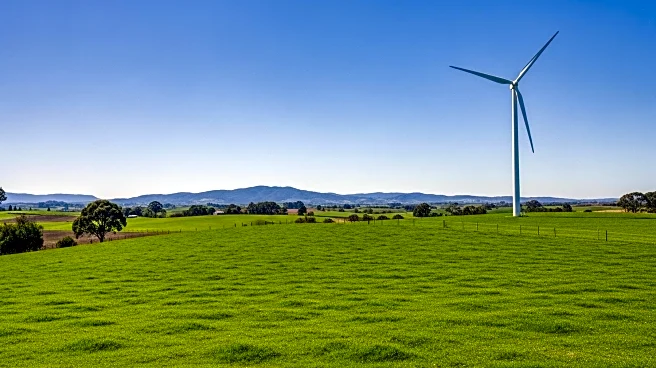What's Happening?
New Zealand has announced a commitment to reduce biogenic methane emissions by up to 24% from 2017 levels by the year 2050. This decision was made by the conservative government to balance the country's climate commitments with the protection of its agriculture sector. Agriculture Minister Todd McClay stated that the target, which is yet to be approved by the cabinet, will be set within a range of 14-24% below 2017 levels. The announcement follows the government's decision in April to abandon a plan to impose a price on agricultural emissions, including methane from sheep and cattle, due to concerns from farmers about the potential impact on their profitability. The target will be reviewed in 2040 to ensure alignment with scientific advancements and the progress of key trading partners.
Why It's Important?
The reduction of methane emissions is crucial for New Zealand, where agriculture accounts for nearly half of the country's total greenhouse gas emissions. With approximately 10 million cattle and 26 million sheep, the agricultural sector is a significant contributor to methane emissions. The government's pledge to cut these emissions reflects a commitment to addressing climate change while safeguarding the economic viability of the agriculture industry. This move is significant as it demonstrates a shift towards sustainable farming practices, which could influence global agricultural policies and climate strategies. The decision to review the target in 2040 ensures that New Zealand remains adaptable to scientific developments and international climate agreements.
What's Next?
The next steps involve the cabinet's approval of the methane reduction target, which will set the stage for implementing strategies to achieve these goals. The government will likely engage with industry stakeholders to develop practical measures that support emission reductions without compromising food production or jobs. Additionally, New Zealand may explore technological innovations and partnerships to enhance agricultural efficiency and sustainability. The review scheduled for 2040 will provide an opportunity to adjust targets based on scientific progress and international climate commitments, ensuring that New Zealand remains a leader in sustainable agriculture.
Beyond the Headlines
This initiative highlights the ethical and environmental responsibilities of nations with large agricultural sectors. By setting ambitious methane reduction targets, New Zealand is addressing the ethical implications of climate change and the need for sustainable practices. The decision also underscores the importance of balancing economic interests with environmental stewardship, a challenge faced by many countries globally. Long-term, this commitment could lead to cultural shifts in farming practices, promoting a more sustainable and environmentally conscious approach to agriculture.









